Posts Tagged ‘Boston’
Three Bike Helmet Donation Events from Our Project KidSafe Campaign
Wearing a bicycle helmet is the most effective way to prevent a serious head injury on a bicycle. It is most important for young children who are still in development and building their strength.
Breakstone, White & Gluck is continuing its commitment to bicycle safety by donating children’s bicycle helmets through our Project KidSafe campaign. Here are a few recent and upcoming events:
Kiwanis Club of Somerville. For the third year, we partnered with the Kiwanis Club of Somerville at Bike Safety Day on May 16th. Each year, the Kiwanis holds the event in a different neighborhood; this year’s event was held at the Dr. Albert F. Argenziano School at Lincoln Park. There was a great turnout and the Kiwanis and Attorney David W. White donated nearly 120 bicycle helmets. Children were also offered free bike inspections, reflectors, safety information and the chance to test out their skills on bicycle obstacle courses. Read more about the Kiwanis Club of Somerville.
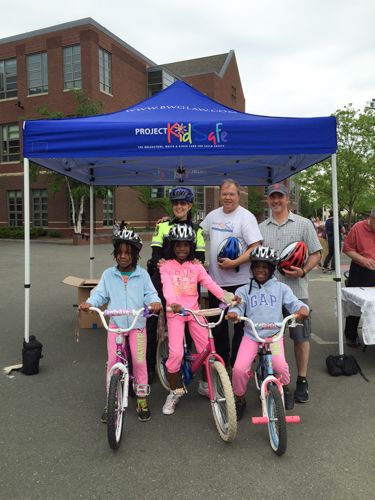
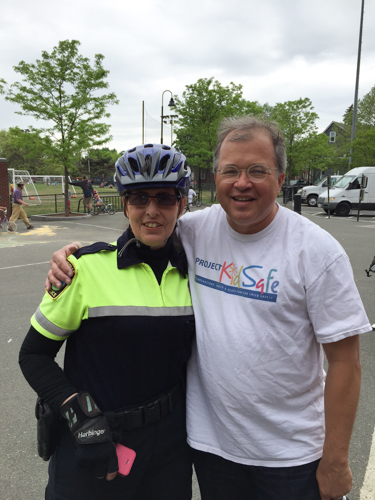
Worcester Earn-a-Bike. This community bicycle shop teaches local residents the basics of bicycle maintenance while letting them work to earn a free bicycle. If you are under 17 years old, you must volunteer for 5 hours to receive a free bicycle and anyone over age 17 must volunteer for 10 hours.
Worcester Earn-a-Bike is also known for its popular annual Kids Bike Sale. This year’s event will be held on June 6th. This is a fun event because every child’s bicycle is on sale for just $5. Breakstone, White & Gluck participates by donating free bicycle helmets to children who need one. This is the second year we have partnered up with Worcester Earn-a-Bike. Read more about Worcester Earn-a-Bike.
Friends of Lexington Bikeways. The Friends of Lexington Bikeways donated bicycle helmets from Project KidSafe to children at Discovery Day on May 23. The group showed children how to properly fit the helmets and spoke about safety with parents and children. This is the second year we have partnered up with the Friends of the Lexington Bikeways, which is active in promoting and supporting safe cycling and development of bike routes. Read more about the Friends of Lexington Bikeways.
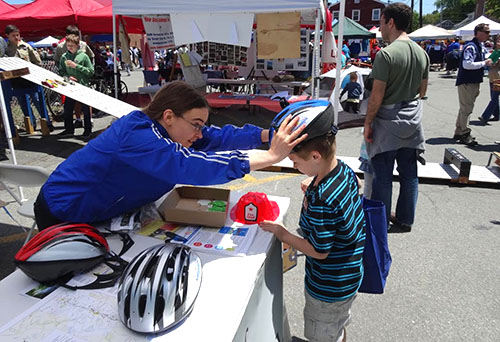
Photo: A volunteer helps a child adjust a bicycle helmet at Discovery Day in Lexington, Massachusetts.
Breakstone, White & Gluck Participates in Bike Friday
Today was Bike Friday, sponsored by Boston Bikes, the city office which promotes safe cycling. Bike Friday is one of the last events of Bay State Bike Week. It included a number of organized rides and a gathering at Boston City Hall. Breakstone, White & Gluck was there to share information about our Project KidSafe campaign.
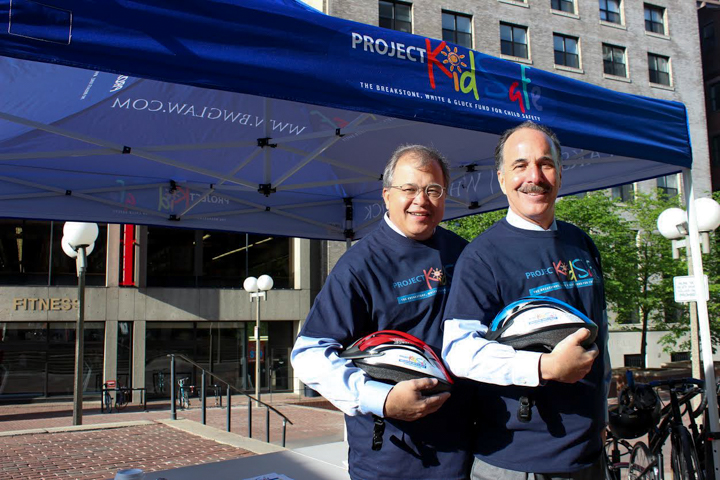
Attorney David W. White and Attorney Marc L. Breakstone of Breakstone, White & Gluck participated in Bike Friday at Boston City Hall Plaza. The two attorneys were there to support the cyclists as they rode in and to share information about the firm’s Project KidSafe campaign.
Boston Bikes organizes Bike Fridays to celebrate those who ride their bikes to work and to encourage others. More than two dozen organizations and vendors signed up for today’s event. While 200 cyclists registered for the event, organizers estimated up to 350 cyclists actually pedaled in and enjoyed a free breakfast, courtesy of Boloco.
Breakstone, White & Gluck participated for the first time and set up our Project KidSafe tent to show support for the cyclists. Attorneys David W. White and Marc L. Breakstone were among the crowd waiting for the cyclist convoys, which came in from Lexington, Newton, Somerville and many other communities.
Other organizations which participated included MassBike, Boston Cyclists Union, Livable Streets Alliance, Hubway and Landry’s Bicycles.
Marc and David spoke to a number of cyclists about our Project KidSafe initiative, through which we donate bicycle helmets to children who need one in the Boston and Worcester areas. We have donated more than 4,000 bicycle helmets since 2013, through partner organizations such as CYCLE Kids of Cambridge, Somerville and Cambridge public schools, Bikes Not Bombs, Massachusetts Safe Routes to Schools, the Westborough Bicycle and Pedestrian Advisory Committee. We have also worked with Boston Bikes’ Roll It Forward program, which refurbishes used bicycles and donates them to city residents who may not otherwise have access to a bicycle.
After the event, Marc said, “It is rewarding for us to be able to give back to the community in a way that promotes safety for children. We look forward to continuing our Project KidSafe program, and to expanding it in the years to come.”
The next Bike Friday events are scheduled for June 26th, July 24th and August 28th. Read more about the event.
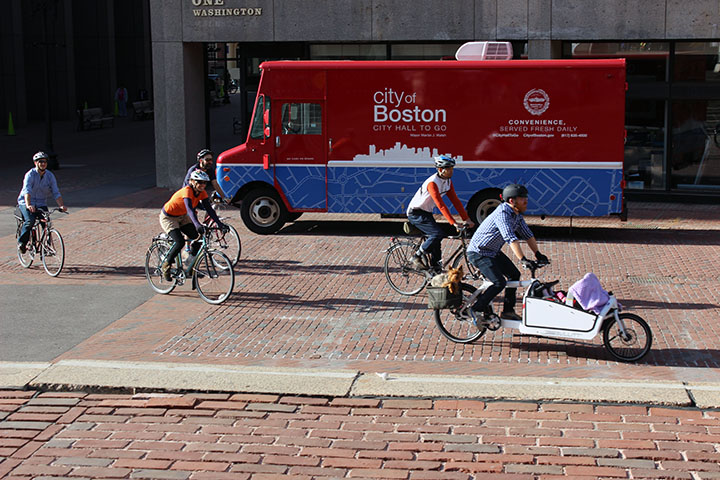
The cyclists came in in convoys this morning, traveling in from Lexington, Arlington and other communities. While 200 cyclists registered in advance, organizers estimate 350 actually rolled in.
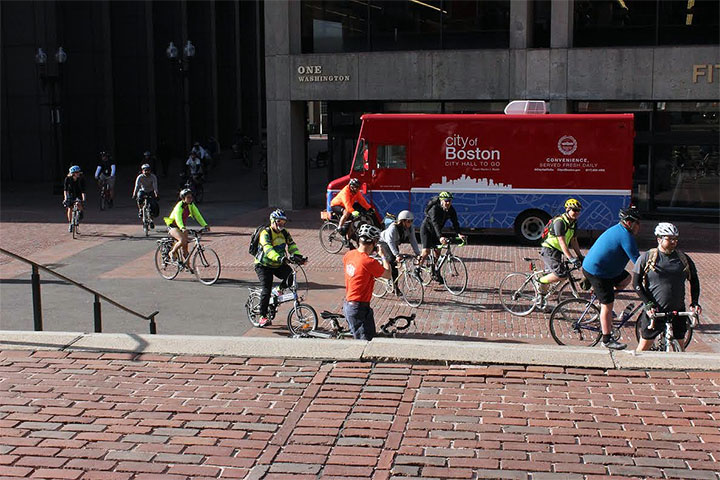
Bay State Bike Week is Here: Breakstone, White & Gluck to Donate Children’s Bicycle Helmets in Somerville
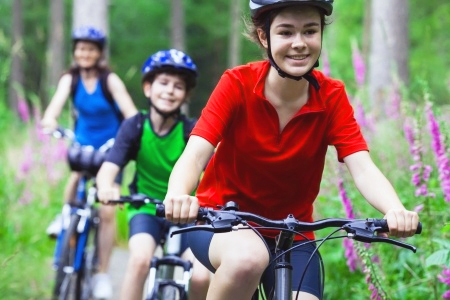 For cyclists, this is one of the best weeks of the year: Bay State Bike Week. It started Saturday and runs through next Sunday, May 17th.
For cyclists, this is one of the best weeks of the year: Bay State Bike Week. It started Saturday and runs through next Sunday, May 17th.
May is National Bike Month and Bay State Bike Week is how we celebrate in Massachusetts. This is a truly statewide event, with groups organizing gatherings, rides and photo exhibits throughout Massachusetts. These events are a great way to learn about cycling in Massachusetts, as well as safety. There are some groups working hard to prevent bicycle accidents in our state and this is the time to see their work.
Bay State Bike Week is a partnership between the Massachusetts Department of Transportation (MassDOT), MassBike and MassRides. If you are a cyclist, check out the list of events.
Here are a few events of note. Watch for us! We may be participating in a few.
A few events to watch:
Cambridge. This will be a busy week in Cambridge, with a wide range of events, from pancake breakfasts to lunches with the Cambridge Police Department and city planning staff, where cyclists can ask questions. On Saturday, cyclists gather for a two-hour ride in honor of the late talk host Tom Magliozzi of Cambridge, who was best known for hosting Car Talk on NPR alongside his brother.
There are also bicycle maintenance workshops throughout the week, where cyclists can take home a few tips for free.
Waltham. Waltham is hosting its Second Annual City of Waltham Bicycle Update on Wednesday at 6 p.m., at the Government Center Auditorium on School Street. With more than 60,000 residents, large employers and colleges, the city is looking to encourage safe cycling as an alternative form of transportation.
Lexington. Free bike safety checks will be offered throughout the week. On Friday, a light breakfast is free on the Minuteman Bikeway, near the Lexington Depot. Then Richard Fries, executive director of Mass Bike Director, will lead a bicycle convoy from Lexington to Boston City Hall.
Bike Friday at Boston City Hall. On Friday, the commuters will ride in from all over for Bike Friday, where they are rewarded with a free breakfast. This is a popular event organized by Boston Bikes. It is held once a month in the summer and will be one of the last events of Bay State Bike Week. Attorney David W. White will be out with our Project KidSafe tent as the cyclists pull in.
Somerville Bike Day. For the third year, we will join the Somerville Kiwanis at the city’s annual Bike Day at Argenziano School on Washington Street. We will donate 120 new helmets and help fit the helmets for the children. Children will receive a free bicycle inspection, reflectors, and safety pamphlets and get to test their skills on a bicycle obstacle course. The Somerville Police Department will be on hand to register bikes for children.
Western Massachusetts Events. There will be commuter breakfasts, mayor’s rides and photo exhibits in Westfield, Amherst, Springfield and Northampton.
Cape Cod Events. There are several rides and interesting events in Cape Cod this week, but one of note is the Cape Cod Summer Citizens – Bike Safety Outreach Program. Each year, thousands of international students arrive on Cape Cod to arrive in work and travel programs. They primarily have to travel on bicycles and this program starts this week. This program provides education to all cyclists throughout the busy tourist season.
Read More
A Day of Donating Bicycle Helmets in Westborough
We had a great day in Westborough last weekend: Two fun community events, great weather and we handed out 160 free bicycle helmets to children. For this, we partnered up with the Westborough Bicycle and Pedestrian Advisory Committee and the Boroughs Family Branch of the YMCA of Central Massachusetts.
Breakstone, White & Gluck donated the bicycle helmets as part of our Project KidSafe outreach. Attorney David W. White helped distribute the free helmets at Westborough’s Spring Festival, an event featuring just about everything which is hosted by the Rotary Club of Westborough. In addition to bicycle helmets, there was an amateur dog show, children’s carnival, road race, food vendors and the list goes on.
Attorney White and Bruce Tretter, chairman of the Westborough Bicycle and Pedestrian Advisory Committee, then went to hand out helmets at the Boroughs Family Branch of the YMCA of Central, which is nearby in Westborough.
“We had a lot of fun, though at times it was a little hectic because so many people were anxious to get helmets for their kids,” attorney David White said. He added, “Wearing a bicycle helmet is the most important step you can take to protect yourself as a cyclist and I hope the children and families left with new helmets and a new commitment to wear them every time they ride.”
Breakstone, White & Gluck donated these bike helmets through our Project KidSafe initiative. We have donated over 3,500 helmets to children in Massachusetts since 2013. By year’s end, we expect to have donated 6,000 helmets. Read more about our Project KidSafe outreach or our bicycle safety tips.
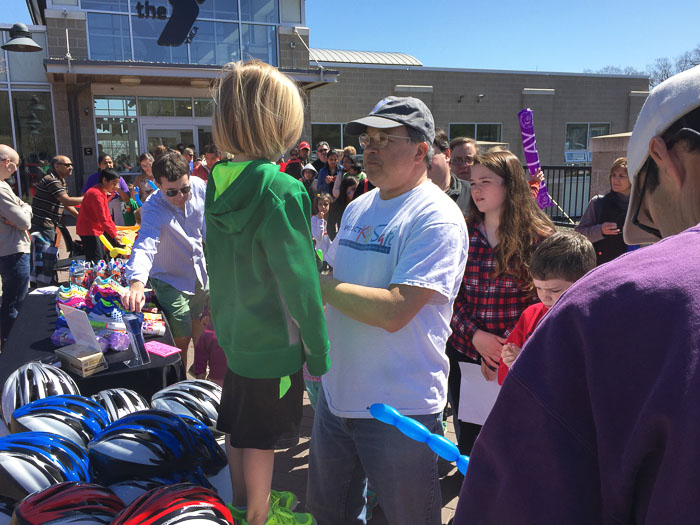
Photo: Attorney David W. White of Breakstone, White & Gluck helping a child at the Boroughs Family Branch of the YMCA of Central Massachusetts in Westborough.
![20150502-IMG_1751[1]-Edit.jpg](https://www.massachusettsinjurylawyerblog.com/wp-content/uploads/2016/05/20150502-IMG_17511-Edit.jpg) Photo: From left in back: Bruce Tretter, Chairman of the Westborough Bicycle and Pedestrian Advisory Committee; Betsy Moquin, Director of Marketing & Advancement of the Boroughs Family Branch of the YMCA of Central Massachusetts; and Attorney David W. White of Breakstone, White & Gluck.
Photo: From left in back: Bruce Tretter, Chairman of the Westborough Bicycle and Pedestrian Advisory Committee; Betsy Moquin, Director of Marketing & Advancement of the Boroughs Family Branch of the YMCA of Central Massachusetts; and Attorney David W. White of Breakstone, White & Gluck.
![20150502-IMG_1747[1].jpg](https://www.massachusettsinjurylawyerblog.com/wp-content/uploads/2016/05/20150502-IMG_17471.jpg) Photo: Bruce Tretter, Chairman of the Westborough Bicycle and Pedestrian Advisory Committee, helps a child find a helmet.
Photo: Bruce Tretter, Chairman of the Westborough Bicycle and Pedestrian Advisory Committee, helps a child find a helmet.
Check if Your Trek Bicycle Has Been Recalled
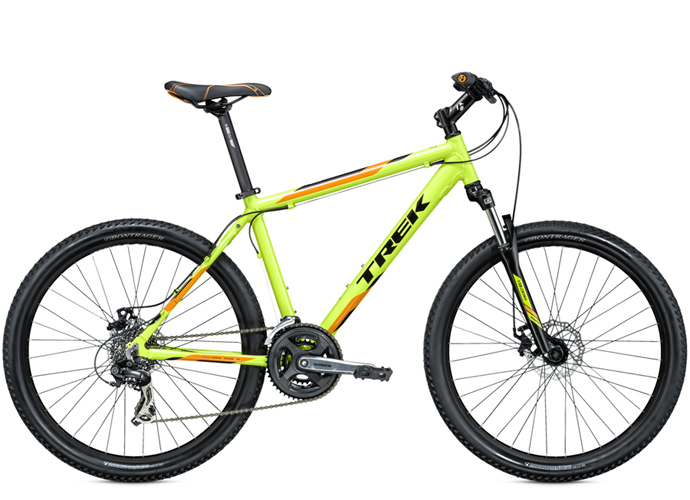
Nearly one million Trek bikes have been recalled after a cyclist was left paralyzed by an accident caused by a defective front disc brake.
About 900,000 bicycles in the U.S. and 98,000 bicycles in Canada were recalled recently by Trek Bicycle Corporation of Waterloo, Wisconsin. The recall involves bicycles sold nationwide from September 1999 through April 2015 for between $480 and $1,650.
Bicycles involved in the recall have a quick release lever on the bicycle’s front wheel hub that can come into contact with the front disc brake assembly, causing the front wheel to come to a sudden stop or separate from the bicycle, posing a risk of serious injury to the rider. Defective bicycles have a front quick release lever that expands beyond 180 degrees.
Trek issued the recall after reports of three injuries, including one person who suffered quadriplegia. A second person suffered facial injuries and another suffered a fractured wrist.
Consumers should stop using these Trek bicycles immediately. Call an authorized Trek retailer for a free inspection and installation of a new quick release on the front wheel of your bike. Trek is trying to encourage cyclists to seek the repair by offering a $20 coupon toward Bontrager merchandise.
Trek has not released a list of specific bicycle model numbers. Cyclists need to check their own bicycles and see if they are impacted by this recall. Some bicycles involved in this recall were purchased many years ago and owners may not have the original paperwork. Or you may have purchased one of these bicycles secondhand.
Do your due diligence and seek out a Massachusetts bicycle shop which sells Trek bicycles. Ask for a free inspection and have them make the free repair if needed.
Find a Trek bike dealer.
Read More
Free Bike Helmets for the Children at Framingham Earth Day Festival Last Weekend
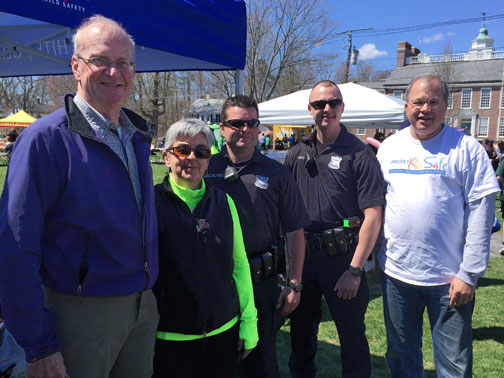
Photo left to right: Bill Hanson, chair of the Framingham Bicycle and Pedestrian Advisory Committee, volunteer Maura Kelly, Framingham police officers and Attorney David W. White of Breakstone, White & Gluck.
Breakstone, White & Gluck, the Framingham Bicycle and Pedestrian Advisory Committee, and the Framingham Police Department teamed up and gave away 120 bicycle helmets to children last weekend at the 5th Annual Framingham Earth Day Festival.
Breakstone, White & Gluck donated the helmets through our Project KidSafe initiative and attorney David W. White participated in the event, along with advisory committee members, including Bill Hanson, chair of the advisory committee, member Joseph Repoli, volunteer Maura Kelly and Framingham police officers.
Framingham Earth Day is held on the Framingham Centre Common and each year the event grows. It began in 2011 with 55 vendors encouraging residents to make eco-friendly choices. This year, nearly 100 vendors turned out. Breakstone, White & Gluck first participated in the festival last year.
Through our Project KidSafe initiative, Breakstone, White & Gluck has donated over 3,500 bicycle helmets to children in the Boston and Worcester areas. We expect to have donated more than 6,000 bicycle helmets by year’s end. Our goal is to encourage children to wear a bicycle helmet every time they ride.
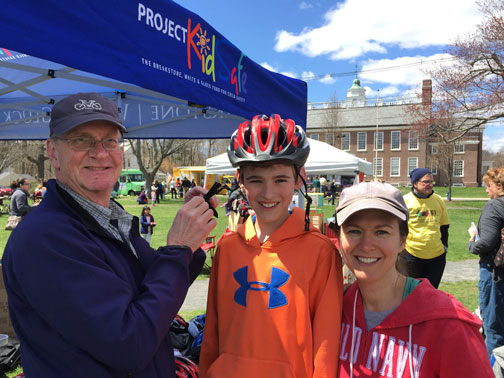
Cyclists of all ages should wear bicycle helmets to protect themselves from a serious head injury. But bicycle helmets are especially important for children, and they are required to wear them by law in Massachusetts.
Children suffer more than half of all bicycle-related injuries and deaths which require emergency department care each year, according to the Centers for Disease Control and Prevention (CDC). Some 26,000 of these bicycle-related injuries to children and teenagers are traumatic brain injuries treated in emergency rooms.
Watch this video on how to properly fit a bicycle helmet or visit our bike safety web page.
Read More
For Parents: Treat Your Child’s Sports Injuries Properly and Take Steps for Prevention
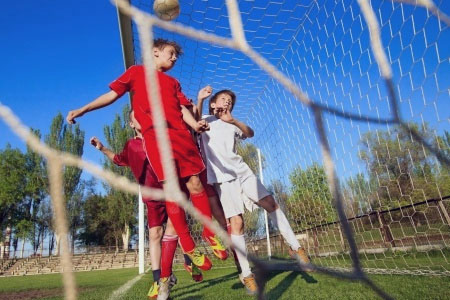 April is National Youth Sports Safety Month, an annual event sponsored by the Stop Sports Injuries organization.
April is National Youth Sports Safety Month, an annual event sponsored by the Stop Sports Injuries organization.
All parents of young athletes fear sports injuries – and there are a large number out there. A 2013 ESPN article reported that more than 21 million children and teens (between ages 6 and 17) are playing organized sports in the U.S.
But a large number of children and teens are also playing, then quitting because of injury. Some 29 percent of boys quit due to a health problem or injury and 27 percent of girls quit for the same reason, according to ESPN’s report.
A few other noteworthy figures:
- Roughly 2.7 million kids under age 20 were treated for sports and recreation injuries between 2001 and 2009.
- There was a 62 percent increase in the number of children under 19 who were treated for traumatic brain injuries (TBIs).
- Football concussions among children age 10 to 14 more than doubled from 2000 to 2010.
Sports programs are a big part of many children’s lives. The experiences will shape them into adulthood and should be enjoyed. But parents, children and coaches must also remember the rules of safety and learn the symptoms of a concussion and the proper ways to treat a head injury.
Symptoms of a concussion may include headaches, dizziness, trouble concentrating, amnesia surrounding the traumatic event, confusion or feeling in a fog, ringing in ears, nausea, vomiting, slurred speech, delayed response to questions and fatigue. Other symptoms may set in later, including memory and concentration problems, personality changes, sleep disturbances, psychological adjustments, depression and problems with taste and smell. When someone shows signs of these symptoms, they should receive immediate medical attention. But anytime a child suffers a concussion or head injury, they should be evaluated by a medical professional regardless of these symptoms.
Here are a few tips for parents:
Listen to Concussion Safety Information. Listen when your child’s coach talks about sports injuries and concussion prevention at the start of the season. In Massachusetts, middle school and high school sports coaches are required to provide training and prevention information related to concussions, under a state law passed in 2010.
Properly Warm Up. Make sure your child properly warms up, even if you drop them off late. Lack of proper warm ups make your child vulnerable to muscle and other injuries.
Football. Make sure your young football player properly warms up, takes proper precautions on those warm late August days to prevent overheating and is educated about symptoms of a concussion. This is important in all sports, but football players are especially vulnerable due to the high contact involved in the game.
Baseball and Softball. Make sure your baseball player properly warms up to protect against arm and shoulder injuries. Then make sure your child pays attention to the coaches and umpires and always focuses on the batter to avoid getting hit. Paying attention is more important than anything else in baseball because balls and bats are always moving quickly. Read more tips on our website.
Soccer. Players are vulnerable to head and other injuries from contact with the other team. Players are often running fast, with their full attention on the soccer ball, neglecting to see other players coming at the ball with just as much force. When someone gets hurt like this, they should step off the playing field and be evaluated by a coach or yourself.
For more safety tips, visit the Stop Sports Injuries website for more tips.
Read More
Parents: Time to Talk to Teen Drivers About Safety
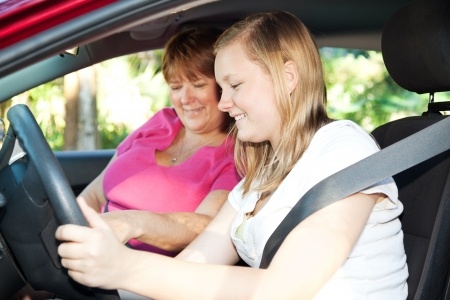 With the snowbanks nearly gone, your teen driver is likely asking for the car keys. Now is a very good time to talk to them about paying attention on the roads and following traffic laws.
With the snowbanks nearly gone, your teen driver is likely asking for the car keys. Now is a very good time to talk to them about paying attention on the roads and following traffic laws.
Young people ages 16 to 19 are nearly three times more likely to be in a fatal motor vehicle crash than other age groups. While cell phone use is a frequent cause, there is also simple inexperience. If you are a parent, you know this conversation takes a lot of work and a lot of repetition.
We offer these safety tips for teen drivers:
- Always wear your seat belt.
- Keep your hands on the wheel and your eyes on the road.
- Do not take phone calls while driving. The caller can leave a voicemail.
- Remember that under Massachusetts Junior Operator License, teen drivers are not allowed to use cell phones behind the wheel. You cannot send texts or make phone calls. If you are caught, you may be fined and your license suspended. It is important to think about these steps for the safety of others and to keep yourself out of trouble.
- If you must use your phone, pull off the road to a safe area. Put the car in park and remove the keys. Or ask a passenger to call or answer for you.
- Travel with the phone in the best place to reduce distraction. If your phone ringing or lighting up with messages distracts you, set it in a bag in the backseat.
- Remember that whatever is happening on your phone can wait, whether it is a social media post, e-mail or photo. It really can.
- Be mindful of distractions created by loud music or intense conversation. Explain to passengers you need to limit conversation while driving.
- Remember you cannot carry passengers under the age of 18 during the first six months with a Massachusetts Junior Operator License. The one exception is you can drive with siblings.
- Do not look up phone numbers or GPS directions on your phone while driving.
- Many cars have dashboard GPS systems and infotainment systems. Turn them off until you are more experienced.
Other Safe Driving Habits
- Never consume alcohol and drive. No driver should, but you are more likely than older drivers to get in car accidents because you lack driving experience.
- Before entering your vehicle, look around for other cars, trucks and hazards. Make sure you provide bicyclists and pedestrians extra time to pass.
- Shift your eyes every two seconds and check the rear-view mirror every five to eight seconds. This will help you focus on driving.
- Do not drive drowsy. If you are tired, you will be less capable of responding to potential car accidents. The Massachusetts Junior Operator License restricts young drivers from traveling between 12:30 a.m. and 5 a.m., unless accompanied by a parent. This is a good step but realize you always have to be aware of your fatigue level and make good decisions at all hours.
- Even if you have your license, keep practicing. For instance, if you are weak backing up, practice backing into a parking space in an empty parking lot with a parent. Keep practicing because you will need these skills going forward and will not always have the time to practice.
- There are construction work zones in many places. Be extra attentive, slow down and watch for workers.
- Check your speed regularly and slow down. A little extra space between you and the car in front of you can make a big difference toward preventing a car accident.
- Drive defensively. Expect the unexpected will happen and you may have to stop or change lanes.
- Signal your intentions to turn or switch lanes early enough to give others time to prepare.
- Do not drive on the highway on your own before you are ready.
- Limit the number of times you drive your friends home after sports practices, to the mail or school events. Every teenager looks forward to driving around with their friends, but teens are more likely to become distracted this way.
- Be careful in school zones and school buses. Slow down and watch out for teenagers and children walking or riding bikes. You are required to stop when school buses stop.
Drive Safely Through Road Construction
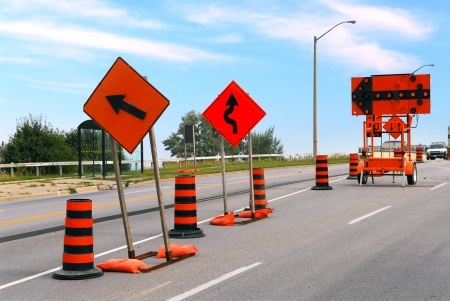 We have all looked forward to Spring this year, waiting for those snowbanks to finally melt so we can drive and walk and ride our bikes more easily. But we will face other challenges soon as construction projects return to the roads.
We have all looked forward to Spring this year, waiting for those snowbanks to finally melt so we can drive and walk and ride our bikes more easily. But we will face other challenges soon as construction projects return to the roads.
National Work Zone Awareness Week is now being observed by safety officials across the country. The annual campaign is held at the start of construction season to encourage safe driving through highway work zones and construction sites. The goal is to protect drivers, passengers, construction workers and others from injuries.
Drivers
- Drivers and passengers are at the greatest risk in a construction zone, accounting for an average of 85 percent of the deaths in highway work zone crashes, according to the Federal Highway Administration (FHA).
- In 2010, 576 people died in work zone crashes, the equivalent of one work zone fatality every 15 hours in this country, according to FHA.
Construction Workers
- Construction workers face many risks on highway work zones. In 2013, 105 construction workers died at road construction sites in this country, according to the Bureau of Labor Statistics (BLS). Other injuries are not included in this figure.
- Transportation accidents accounted for 66 percent of roadway work zone fatal occupational injuries in 2013. In 69 percent of these cases, a pedestrian worker was struck by a vehicle. Backing vehicles out accounted for 27 of the 48 pedestrian vehicular accidents.
Safety Reminders for Drivers
- Move Over. It’s the law in Massachusetts and most other states. Make sure you move over when you see construction signs and lights. And if additional room is not available, slow down.
- No Speeding. In Massachusetts, you can face double the original fine for speeding in a work zone and cause a serious car accident.
- No Distracted Driving. Pay extra attention to the roads as you travel through work zones; reduce distractions in your car from information systems and passengers.
- No Cell Phone Use. Eliminate distracted driving. Do not use your cell phone to text, check e-mail or social media. If you need to use your phone, use a hands-free system.
- Expect the Unexpected. You may not have any notice of a work zone until you are stuck in it. Be patient and be prepared to follow the signs and traffic cops and flaggers. This may mean not following the traffic signals at times.
- Pay Attention to the Signs and Look for Alternate Routes. Look for signs which direct you to detour routes and share other important information. Do not use your GPS until you are safely outside of the construction work zone.
- Mass511. The state’s traffic information system may help you avoid construction areas. Visit the webpage or call.
Safety Reminders for Pedestrians
- Use crosswalks in construction areas if it is safe to do so. If not, follow pedestrian pathways which have been marked by the construction operation.
- Watch how traffic flows before you step out into the street. You may be able to identify a safer path.
- If you know you will be walking through a work zone, consider carrying a neon glow vest and wear it as you cross a street. You want to stand out to road traffic, police officers and flaggers and the construction crew.
Safety Reminders for Cyclists
- Cyclists want to learn about roadway construction ahead of time. After all, there is nothing much worse than a mile of recently milled black top to shake your fillings loose. Call the local town or city hall or call the Mass511 service.
- Some of the cycling clubs in the Boston area also do a good job of alerting members of safety issues. One popular source of information is the Charles River Wheelmen’s safety articles. Look for cycling clubs in your area and ask if they offer a members forum or a newsletter.
Safety Reminders for Construction Workers
- Be vigilant about following OSHA and other safety procedures of your profession.
- If you are working on foot, make sure you are always aware of any vehicles around you and where there are flaggers and traffic cops.
Related links:
- National Work Zone Awareness Week.
- Highway Work Zone Accidents, by the Centers for Disease Control and Prevention.
Safety for Pedestrians, Cyclists and Drivers
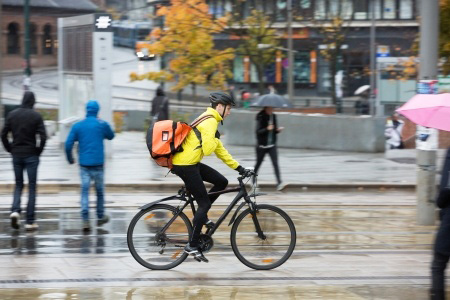 Safety for pedestrians and drivers was in the spotlight this winter, as Boston endured a record snow fall and everyone stood divided by the tallest of snowbanks. Now, as the snow starts to melt, cyclists are back out too and we want to take a moment to share a few safety reminders.
Safety for pedestrians and drivers was in the spotlight this winter, as Boston endured a record snow fall and everyone stood divided by the tallest of snowbanks. Now, as the snow starts to melt, cyclists are back out too and we want to take a moment to share a few safety reminders.
Safety was a priority this winter because Massachusetts saw many car accidents, even though state officials called multiple snow emergencies, and many schools closed, to keep the roads clear. We also saw at least two fatal pedestrian accidents. In Weymouth, a woman was hit and killed by a snow plow as she walked in the parking lot of her condominium complex. A 60-year-old employee at a Medford Whole Foods store also was killed, hit by a snow plow in the parking lot, leaving after his work shift.
Safety advocates made progress on protecting cyclists and pedestrians in 2014. This will serve as a strong foundation as we dig out from this harsh winter. In Boston, the city has implemented a truck safety ordinance, requiring that city-contracted trucks use sideguards and other protections aimed at protecting pedestrians and cyclists.
MassBike and other safety advocacy groups have also proposed new legislation which may get attention after this hard winter. If passed, the Bike Lane Protection Bill would make it illegal to block established bike lanes. The Vulnerable Road Users Bill would define pedestrians, cyclists, emergency personal and others as vulnerable road users and define a safe-passing distance for them.
Here are a few safety tips and facts to remember for pedestrians, cyclists and drivers:
Pedestrians
- Pedestrian accidents are too common. On average, in 2013, a pedestrian was killed every two hours and injured every eight minutes in traffic crashes, according to the National Highway Traffic Safety Administration (NHTSA).
- Walk on the sidewalks whenever possible. If a street only has sidewalks on one side, cross over.
- If you have to walk on the street, walk so you are facing oncoming motor vehicle traffic. Walk as close as you can to the curb to increase the space between you and traffic.
- Use crosswalks whenever they are available.
- Limit use of cell phones, iPods and music players.
- A common misperception is most pedestrian accidents happen at intersections. That is not true. Some 69 percent of pedestrian accidents occurred at non-intersections in 2013, according to the NHTSA.
- Some 10 percent of pedestrian accidents happened off the road, in areas such as parking lanes/zones, bicycle lanes, shoulders/roadsides, driveway access and similar areas.
- In the Spring of 2013, most pedestrian fatalities, 25 percent, occurred between 9 to 11:59 p.m., according to the NHTSA. Another 22 percent occurred between 6 to 8:59 p.m.
- If you walk at night, purchase a neon glow vest so you stand out to traffic. Even if you never wear it, it pays to be prepared.
Bicyclists
- Wear a bike helmet which meets the safety standard of the Consumer Product Safety Commission and properly fits.
- Cyclists follow different rules than pedestrians. Go with the flow of traffic, traveling in the same direction as cars, on the right side of the road. Up to two cyclists can ride in the middle of the traffic lane abreast if necessary to stay safe, but you should move back onto the side of the road single file when you can safely do so.
- State law prohibits biking on sidewalks in business districts. Not every city and town has a designated business district. But assume you are not allowed to ride on the sidewalk or ask the local police department for guidance.
- Cyclists must use hand signals to communicate to drivers, unless it would be unsafe to do so. You can view this video to learn the proper hand signals. Cyclists should also use a bell to let pedestrians know they are approaching.
- Watch out for dooring. This is when a car parks and the driver opens their door and hits you as you pass through. It is against the law, but it happens often.
- You are required to use a white headlight and red taillight or rear reflector if you ride anytime from a half hour after sunset until a half hour before sunrise.
- If you ride at night, consider purchasing a neon safety vest or clothing so you are more visible drivers..
- If you are involved in a bicycle accident, file a police report, even if you do not think you are seriously injured at first.
- Many drivers may not stop after cycling accidents. If you are hit and the driver does not stop, immediately contact police and file a police report.
Motor Vehicle Drivers
- Look for cyclists and pedestrians at every intersection and yield to them.
- Drivers must pass bicyclists at a safe distance. If you cannot, you must wait until it is safe to do so or change lanes.
- Obey all traffic laws and signals. Look for areas designated as school zones. Reduce your speed and take extra care on these roads.
- Do not park in bike lanes.
- Do not use your cell phone in the car. It is against the law in Massachusetts for drivers to text and drive, but the best practice is not to use it for telephone calls or other reasons either. It only takes a few seconds to cause a distracted driving car accident.
- A very dangerous practice is dooring. This is when a driver parks their car and opens the door without looking and hits an oncoming cyclist. It is against the law and violators can be fined. But drivers may also face a steeper penalty, a personal injury lawsuit, because cyclists can be seriously injured and the injuries can require months of recovery and hospital bills.
More Cycling Safety Resources
These are just a few rules of the road. To learn more, visit:
Shifting Gears: Bicyclists and Public Safety. Produced by MassBike, the Massachusetts Department of Public Health and the Boston Police Department.
Bike Safety in Massachusetts, Breakstone, White & Gluck.
What Every Massachusetts Bicyclist Needs to Know About Car Insurance, Breakstone, White & Gluck.

